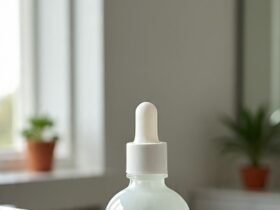It sits on your kitchen shelf, praised for its detox power, weight loss support, and gut-friendly properties. But lately, it’s making waves in skincare circles too. From tightening pores to fading dark spots, apple cider vinegar (ACV) is gaining attention as a natural solution for common skin issues, including moles and skin tags. But before applying it to your face or neck, it’s worth asking a critical question. Is using apple cider vinegar for moles and skin tags actually safe?
If you’ve been scrolling through DIY skincare forums or watching viral videos, you’re not alone in wondering if something so simple could really work. The truth lies somewhere between natural curiosity and skin science.
What ACV Really Does to Skin Growths
Apple cider vinegar contains acetic acid, a natural acid that can break down soft tissue and exfoliate the skin. When applied to a mole or skin tag, the acid may slowly burn the surface tissue. This is what leads some people to believe that regular dabbing of diluted ACV can shrink or even remove unwanted skin growths.
The method often looks like this. Clean the area, soak a cotton ball in diluted apple cider vinegar, place it on the mole or tag, secure it with a bandage, and leave it on for several hours or overnight. This routine is repeated daily for one to two weeks, with the hope that the mole darkens, scabs over, and eventually falls off.
Why It’s Risky to Use ACV on Moles
Some women say they’ve had success. But success stories are not the same as scientific studies. While ACV has antimicrobial and anti-inflammatory benefits, it hasn’t been medically approved for mole or tag removal. And more importantly, the skin on your face, neck, or chest is delicate. Acids, even natural ones, can burn or scar that skin if used too aggressively.
What starts as a harmless home experiment can lead to permanent pigmentation, sensitivity, or worse, skin damage that’s harder to treat than the mole itself.
There’s also a deeper concern. Not all moles are safe to treat at home. A mole that changes in shape, size, or color could be a sign of melanoma or other skin abnormalities. Removing it with vinegar or anything else at home might mask early signs of something serious. That’s why dermatologists strongly recommend professional evaluation before applying any substance to a mole, natural or not.
When It Might Work (and When It Won’t)
Still, it’s easy to understand the appeal. When something is bothering you visually, it’s tempting to try anything that promises quick results. Especially when it’s already sitting in your kitchen. But skin care isn’t about convenience. It’s about safety, long-term wellness, and treating your body like something worth protecting.
If you’re determined to try apple cider vinegar on a skin tag instead of a mole, the risk may be slightly lower. Skin tags are benign and non-cancerous, and some people do report they fall off after consistent ACV use. Even then, the approach should be cautious. Always dilute the vinegar, never apply to irritated or broken skin, and stop immediately if you experience stinging, burning, or discoloration beyond the tag itself.
Another factor to consider is skin type. Women with sensitive or dry skin are more likely to experience irritation. If you’ve struggled with eczema, rosacea, or acne-prone skin, vinegar may cause more harm than help. What works for someone else on TikTok or Pinterest might not be suited to your skin’s needs, especially if your skin is already stressed.
A Gentler Way to Think About Skin Care
For some, professional mole or tag removal might sound intimidating or expensive. But seeing a board-certified dermatologist can give you peace of mind and clarity. You’ll know exactly what you’re dealing with, and you can choose a removal method that’s both effective and safe. Whether it’s freezing, snipping, or laser-based.
And if you’re looking for gentler, natural options, there are safer alternatives to try. Tea tree oil, vitamin E, castor oil, and even simple changes in your skincare routine can sometimes reduce friction and prevent tags from growing further. The key is to stay patient, consistent, and mindful about what your skin is trying to tell you.
Natural remedies like apple cider vinegar for moles might seem harmless, but your skin deserves more than guesswork. If you do decide to try it, do your research, test it safely, and never ignore the signs your skin gives you. The best results always come from a mix of care, knowledge, and a little compassion, for your body and yourself.















Leave a Reply
View Comments